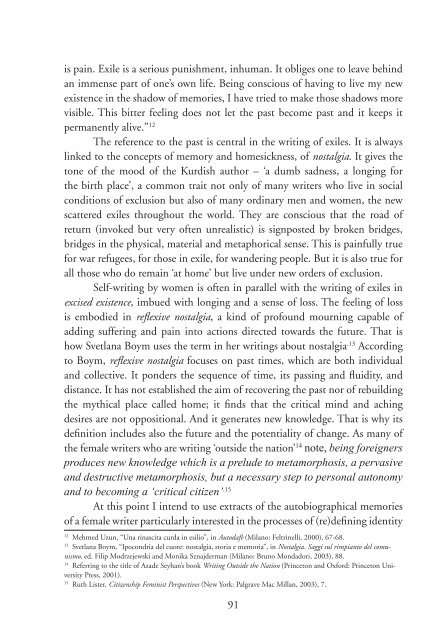Teaching Subjectivity. Travelling Selves for Feminist ... - MailChimp
Teaching Subjectivity. Travelling Selves for Feminist ... - MailChimp
Teaching Subjectivity. Travelling Selves for Feminist ... - MailChimp
Create successful ePaper yourself
Turn your PDF publications into a flip-book with our unique Google optimized e-Paper software.
is pain. Exile is a serious punishment, inhuman. It obliges one to leave behind<br />
an immense part of one’s own life. Being conscious of having to live my new<br />
existence in the shadow of memories, I have tried to make those shadows more<br />
visible. This bitter feeling does not let the past become past and it keeps it<br />
permanently alive.” 12<br />
The reference to the past is central in the writing of exiles. It is always<br />
linked to the concepts of memory and homesickness, of nostalgia. It gives the<br />
tone of the mood of the Kurdish author – ‘a dumb sadness, a longing <strong>for</strong><br />
the birth place’, a common trait not only of many writers who live in social<br />
conditions of exclusion but also of many ordinary men and women, the new<br />
scattered exiles throughout the world. They are conscious that the road of<br />
return (invoked but very often unrealistic) is signposted by broken bridges,<br />
bridges in the physical, material and metaphorical sense. This is painfully true<br />
<strong>for</strong> war refugees, <strong>for</strong> those in exile, <strong>for</strong> wandering people. But it is also true <strong>for</strong><br />
all those who do remain ‘at home’ but live under new orders of exclusion.<br />
Self-writing by women is often in parallel with the writing of exiles in<br />
excised existence, imbued with longing and a sense of loss. The feeling of loss<br />
is embodied in reflexive nostalgia, a kind of profound mourning capable of<br />
adding suffering and pain into actions directed towards the future. That is<br />
how Svetlana Boym uses the term in her writings about nostalgia .13 According<br />
to Boym, reflexive nostalgia focuses on past times, which are both individual<br />
and collective. It ponders the sequence of time, its passing and fluidity, and<br />
distance. It has not established the aim of recovering the past nor of rebuilding<br />
the mythical place called home; it finds that the critical mind and aching<br />
desires are not oppositional. And it generates new knowledge. That is why its<br />
definition includes also the future and the potentiality of change. As many of<br />
the female writers who are writing ‘outside the nation’ 14 note, being <strong>for</strong>eigners<br />
produces new knowledge which is a prelude to metamorphosis, a pervasive<br />
and destructive metamorphosis, but a necessary step to personal autonomy<br />
and to becoming a ‘critical citizen’ .15<br />
At this point I intend to use extracts of the autobiographical memories<br />
of a female writer particularly interested in the processes of (re)defining identity<br />
12<br />
Mehmed Uzun, “Una rinascita curda in esilio”, in Autodafè (Milano: Feltrinelli, 2000), 67-68.<br />
13<br />
Svetlana Boym, “Ipocondria del cuore: nostalgia, storia e memoria”, in Nostalgia. Saggi sul rimpianto del comunismo,<br />
ed. Filip Modrzejewski and Monika Sznajderman (Milano: Bruno Mondadori, 2003), 88.<br />
14<br />
Referring to the title of Azade Seyhan’s book Writing Outside the Nation (Princeton and Ox<strong>for</strong>d: Princeton University<br />
Press, 2001).<br />
15<br />
Ruth Lister, Citizenship <strong>Feminist</strong> Perspectives (New York: Palgrave Mac Millan, 2003), 7.<br />
91

















